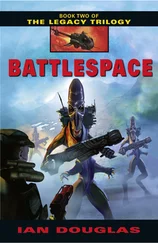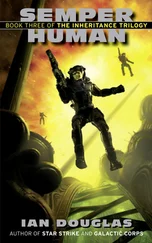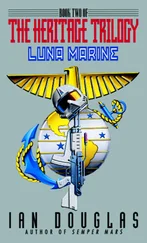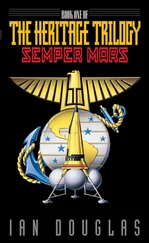Had they accidentally let slip that tidbit about the old galaxy? Koenig tried the direct approach. “So tell me … where are the Sh’daar from?”
Gru’mulkisch twisted her eyestalks in what Koenig had been told was an expression indicating humor—the equivalent of a human smile. “We can’t tell you that, Admiral,” she said. “That data would be extremely valuable, yes-no?”
“There must be an exchange,” Dra’ethde told him. “We have been asked about this before by your intelligence people. …”
“And what would you accept in exchange for that information?” Koenig asked.
“We are not aware of anything you possess worth such an exchange, Admiral,” Gru’mulkisch said. “We regret this … but what you ask is mish’a’ghru . Of first importance, you might say, yes-no?”
“In fact,” Dra’ethde added, “I regret having mentioned gu reheh’mek chaash at all, and perhaps I was irresponsible in doing so. But since the words will not help you, no harm has been done, yes-no?”
The phrase translated as “yes-no,” Koenig knew, was what the xenolinguists referred to as an agreement manipulator , a way to get others to agree with you, to be on your side in a conversation, and to disarm any potential hostility. Individually, the Agletsch were more agreeable to talk with than many humans Koenig knew.
But talking with them tended to lead in unsatisfying circles. Even if the Agletsch translator units perfectly shifted between the English and Agletsch languages, there was a hell of a lot missing on both sides simply because of differences in culture, attitude, and worldview.
Koenig wondered how much of their professional reticence was due to business considerations, and how much to the fact that both of them carried Sh’daar Seeds that, no doubt, were listening in on this conversation and recording it.
“We are about to emerge from Alcubierre Drive,” he told them. “I can’t allow you on the bridge or in the CIC, but I’ve given orders to dress the crew’s lounge for external view, and you can watch from there.”
“Thank you, Admiral.”
“My senior aide, Lieutenant Commander Nahan Cleary, will be with you. If I have questions of you two, I’ll pass them to him. Okay?”
“Quite acceptable, Admiral.”
“And if either of you have insights about what’s happening, I’d appreciate it if you could share them with him. Such information will be considered to be under the terms of your contract.”
“Of course, Admiral.”
The two Agletsch had volunteered to accompany America and her battlegroup on this mission as guides—which meant that they were expected to share data with Koenig and his officers without the need to haggle over the informational price of each item. His understanding was that the Agletsch mission on Earth had been “paid” for their services with several exabytes of information drawn from the New Library of Congress in Columbus, and from the British Library in High London. He wondered what, specifically, the Agletsch had learned in exchange for the services of these two.
No matter. He expected them to deliver.
“You’re certain,” Koenig said, “that you have nothing to add to your report about this system we’re about to enter?”
“Quite certain, Admiral,” Gru’mulkisch said. “We know that the system is of importance within the Sh’daar network, but we’ve not been here before. We do not believe it to be inhabited, but cannot tell you if it is defended, or if there is a military base or outpost.”
“In fact, we hope to acquire profit here ourselves,” Dra’ethde added. “Yes-no?”
By profit , Koenig assumed the Agletsch was referring to new information, something even the Agletsch did not know.
“What happened to the Chelk,” Koenig told them, “might well happen to my species. If you two learn anything new, I’ll expect you to share it with us. I will invoke the contract if I must.”
“We understand this, Admiral.” Gru’mulkisch sounded almost contrite … or possibly cautious, as though she were picking her sixteen-legged way across thin ice.
“And we appreciate you including us in the investigation,” Dra’ethde said.
“We will be emerging from metaspace in another hour,” Koenig said. “I suggest you get down to the crew’s lounge and make yourselves ready. Mr. Cleary will join you there.”
“Thank you, Admiral,” Gru’mulkisch said. “We expect that this will be of great profit to both our peoples, yes-no? A place neither human nor Agletsch has yet ventured.”
But Koenig still wondered if the many-legged beings could be trusted.
VFA-44
Approaching Texaghu Resch System
112 light years from Earth
1058 hours, TFT
Lieutenant Gray tried to relax within the close embrace of his fighter. Always it was the waiting that was hardest. He checked his in-head time. Five minutes.
The Dragonfires were doing a drop-launch this time, free-falling with the centrifugal force of America ’s rotating hab modules. When it was time to launch, Gray’s fighter would pivot ninety degrees, pointing out and down relative to the turning bay, the magnetic clamps would release, and the hab module’s rotation would fling him into space with a half-G of acceleration—about five meters per second. Once clear of America ’s immense forward shield cap, the squadron would orient on the local system’s sun and then boost; fifty thousand gravities would bring them close to the speed of light in just a whisker under ten minutes.
“Hey, Skipper?” It was Miguel Zapeta, on the squadron channel. “Any word yet on who we’re gonna be fighting? Or if we’re going to be fighting?”
“Nothing yet, Zap,” Gray replied. “We’ll be the first to know, right?”
“Yeah. Except the scuttlebutt I heard was that the bugs know, and they’re leading us into a trap.”
“So, you’re believing scuttlebutt, now? Who told you that shit?”
“Uh … a gal I know in S-2.”
S-2 was the designation for America ’s intelligence department. “Ah, well if Naval Intelligence said it, it must be true, right?”
He heard several chuckles over the squadron channel. Good. Loosen them up a bit. You don’t want them thinking too hard before a drop.
“We’ll be emerging far enough out-system that we’ll have plenty of time for a look around, okay? The entire Sh’daar galactic fleet could be in there, and they’d never even see us if we dropped in, took a look, and then jumped back into Alcubierre Space.” He hesitated, then grinned as he added, “Yes-no?”
That raised laughter from the waiting Dragonfires. The odd patterns of Agletsch speech and their constant use of the phrase “yes-no” was well known to everyone on board America by now.
“Sounds like we have an Agletsch loose in the squadron,” Rostenkowski said, laughing. “Since when did they start driving Dragonfires?”
“Dragonfires, PriFly,” Wizewski’s voice broke in. “Is there a problem?”
“Negative, CAG,” Gray replied. “No problem.”
“Can the chatter in there and focus on your finals. Emergence in three minutes. Drop in sixty seconds after that.”
“Aye, aye, sir.”
No sense of humor, that one.
He was glad the newbies in the squadron could laugh, though. They’d been training hard in sim, but the real deal was never like electronic simulations, no matter how bad-assed realistic the downloads.
If they could enjoy a joke now , they ought to be okay.
He hoped. …
CIC
TC/USNA CVS America
Читать дальше












